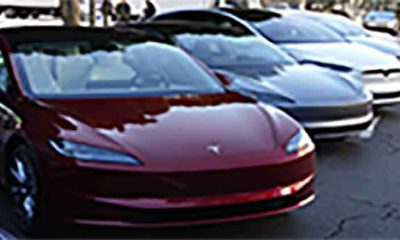Tech
The lower the AI exposure, the bigger the problem for Europe’s chip firms
The lower the AI exposure, the bigger the problem for Europe’s chip firms

Shares in European semiconductor firms less exposed to AI chips slumped on Thursday as falling demand from their key automotive and industrial clients hit business prospects, on top of a wider sector correction.
“The more high-end applications, linked to AI, those are doing much better,” said ING analyst Marc Hesselink.
But even they aren’t immune to a “correction” in stock valuations after strong rallies this year, coupled with worries around the impact of trade spats involving China, the US, and Europe, Hesselink added.
Shares in both ASML and ASMI were down about 3% in early afternoon trading.
Companies with less AI exposure meanwhile were hit harder by industrial clients and automakers cutting orders. Demand for electric vehicles has slowed sharply in Europe.
STMicroelectronics, which supplies Tesla, tumbled 14% after it cut 2024 sales and margin targets for a second time this year, as orders from industrial customers did not improve and automotive demand fell.
Germany’s Infineon, a top automotive chip supplier, fell 6%.
Dutch company NXP Semiconductors earlier this week reported its worst decline in quarterly revenue in four years on weak demand from automotive customers, dragging down some U.S peers with auto exposure.
The sector’s fundamentals remain strong, Hesselink said. Companies still hope that EV demand will be robust in the longer term.
Chip components related to EVs, particularly silicon carbide, will be a growth driver in the second half of the year, STMicro’s CEO Jean-Marc Chery said in a conference call.
Tech
OpenAI, SoftBank each commit 19bn dollars to Stargate AI data center

OpenAI and Japanese conglomerate SoftBank (9984.T) will each commit $19 billion to fund Stargate, a joint venture to develop data centers for artificial intelligence in the U.S., the Information reported on Wednesday.
The ChatGPT maker will hold a 40% interest in Stargate, and would act as an extension of OpenAI, the report said, citing OpenAI CEO Sam Altman speaking to colleagues. His comments imply SoftBank would also have a 40% interest, the report added.
OpenAI and SoftBank did not immediately respond to Reuters’ requests for comment.
On Tuesday, U.S. President Donald Trump announced that OpenAI, SoftBank Group and Oracle (ORCL.N) will unveil Stargate and invest $500 billion over the next four years to help the United States stay ahead of China and other rivals in the global AI race.
Stargate will initially deploy $100 billion and the rest of the funding is expected over the next four years. The project is being led by SoftBank and OpenAI.
Tech
Taiwan’s HTC to sell part of XR unit to Google for 250mn dollars

Taiwan’s HTC (2498.TW) said on Thursday it will sell part of its unit for extended reality (XR) headsets and glasses to Google (GOOGL.O) for $250 million and transfer some of its employees to the U.S. company.
The transaction is expected to close in the first quarter of this year, HTC said.
The two companies will also explore further collaboration opportunities, HTC added.
Google said in a separate statement that the deal will accelerate the development of the Android XR platform and strengthen the ecosystem for headsets and glasses.
Lu Chia-te, HTC vice president and general counsel, told reporters the company had granted its intellectual property rights to Google as a non-exclusive license.
“Therefore, this is not a buyout nor an exclusive licence. In the future, HTC will still retain the ability to use, utilise, and even further develop it without any restrictions,” he said.
Tech
Microsoft’s LinkedIn sued for disclosing customer information to train AI models

Microsoft’s (MSFT.O) LinkedIn has been sued by Premium customers who said the business-focused social media platform disclosed their private messages to third parties without permission to train generative artificial intelligence models.
According to a proposed class action filed on Tuesday night on behalf of millions of LinkedIn Premium customers, LinkedIn quietly introduced a privacy setting last August that let users enable or disable the sharing of their personal data.
Customers said LinkedIn then discreetly updated its privacy policy on Sept. 18 to say data could be used to train AI models, and in a “frequently asked questions” hyperlink said opting out “does not affect training that has already taken place.”
This attempt to “cover its tracks” suggests LinkedIn was fully aware it violated customers’ privacy and its promise to use personal data only to support and improve its platform, in order to minimize public scrutiny and legal fallout, the complaint said.
The lawsuit was filed in the San Jose, California, federal court on behalf of LinkedIn Premium customers who sent or received InMail messages, and whose private information was disclosed to third parties for AI training before Sept. 18.
It seeks unspecified damages for breach of contract and violations of California’s unfair competition law, and $1,000 per person for violations of the federal Stored Communications Act.
A lawyer for Prince Harry on Wednesday said the Duke of Sussex had reached a settlement with Rupert Murdoch’s news conglomerate.
LinkedIn said in a statement: “These are false claims with no merit.”
A lawyer for the plaintiffs had no immediate additional comment.
The lawsuit was filed several hours after U.S. President Donald Trump announced a joint venture among Microsoft-backed OpenAI, Oracle (ORCL.N) and SoftBank (9984.T), with a potential $500 billion of investment, to build AI infrastructure in the United States.
-

 Business2 months ago
Business2 months agoAuto industry’s shift toward EVs is expected to go on despite Trump threat to kill tax credits
-

 Entertainment3 months ago
Entertainment3 months agoBeyoncé leads the 2025 Grammy noms, becoming the most nominated artist in the show’s history
-

 Business3 months ago
Business3 months agoWall Street cruises toward the close of its best week in a year
-

 pakistan3 months ago
pakistan3 months agoPM Shehbaz terms promotion of foreign investment as top priority
-

 World2 months ago
World2 months agoSix Israeli troops killed, deadly strikes in Lebanon
-

 Entertainment2 months ago
Entertainment2 months agoMovie Review: ‘Red One’ tries to supersize the Christmas movie
-

 Business2 months ago
Business2 months agoWall Street gains ground as it notches a winning week and another Dow record
-

 Sports1 month ago
Sports1 month agoSouthampton set to sign Juric as new manager

















